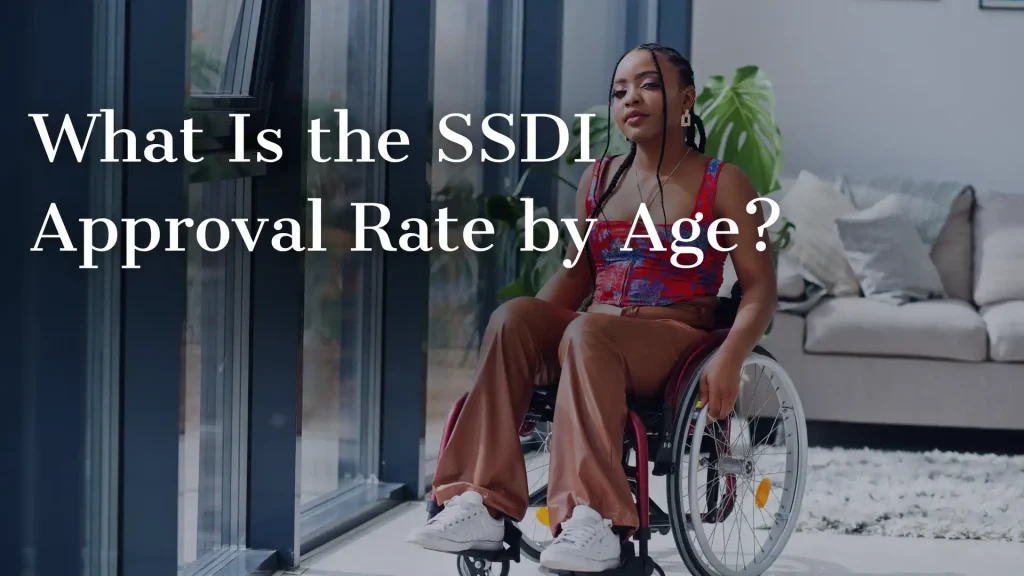
The Social Security Disability Insurance (SSDI) approval rate by age varies significantly, with older disabled applicants generally having higher chances of approval. At Fusco, Brandenstein & Rada, P.C., we understand how crucial this information is for those seeking SSDI benefits. Let’s dive into how age affects SSDI approval rates and what you need to know when applying.
Age Groups and SSDI Approval Rates
The Social Security Administration (SSA) considers age a key factor when evaluating SSDI applications. Here’s a breakdown of approval rates by age group:
Under 50: Lower Approval Rates
Applicants under 50 face the lowest approval rates. The SSA often expects younger individuals to adapt more easily to different types of work. To improve your chances, provide a comprehensive medical condition demonstrating your disability’s severity.
50 to 54: Increasing Approval Rates
Approval rates start to climb in this age group. The SSA recognizes that retraining and adapting to new work environments becomes more challenging. Emphasize specific skills that may not transfer to other occupations.
55 to 59: Higher Approval Rates
This age group sees even higher approval rates. At age 55 to 59, the SSA considers individuals in this range less adaptable to new job opportunities. Focus on how your disability impacts daily activities and work-related tasks.
60 to 64: Highest Approval Rates
Applicants aged 60 to 64 typically have the highest approval rates. The SSA acknowledges reduced employability as you approach retirement age. Highlight any limitations in performing basic daily activities.
65 and Older: Special Considerations
While SSDI typically transitions to retirement benefits at 65, some may still qualify for disability benefits. Approval rates remain high due to limited expectations for adapting to new roles.
Why Age Matters in SSDI Approvals
The SSA recognizes that as people age, their ability to learn new skills and adapt to different work environments changes. Older applicants often need help in retraining or switching careers. This understanding leads to higher approval rates for older individuals.
Factors Beyond Age Affecting SSDI Approval
While age plays a significant role, other factors influence SSDI approval:
- Work History: The SSA examines your work history to ensure you’ve earned enough work credits to qualify for SSDI.
- Medical Evidence: Comprehensive medical documentation is crucial. Provide detailed records of your diagnosis, treatments, and how your disability affects your daily life.
- Severity of Disability: Your condition must significantly impair your ability to work. The SSA evaluates severity using a list of impairments.
- Compliance with Treatment: Following prescribed treatments shows your commitment to managing your condition and strengthening your case.
- Education and Skill Level: Your educational background and transferable skills are considered when determining your ability to perform other types of work.
Improving Your Chances of SSDI Approval
Regardless of your age, here are some tips to enhance your SSDI application:
- Gather Comprehensive Medical Evidence: Collect all relevant medical records, test results, and doctor’s statements. This documentation forms the backbone of your application.
- Be Consistent in Your Treatment: Regular medical visits and adherence to prescribed treatments show the ongoing nature of your disability.
- Provide a Detailed Work History: Clearly outline your past work experience, emphasizing skills that may not transfer to other jobs.
- Consider Legal Representation: An experienced New York Social Security disability attorney can significantly improve your chances of approval. They understand the nuances of the application process and can help present your case effectively.
SSDI Approval Process and Timelines
The SSDI approval process typically takes three to five months, but it can sometimes extend up to seven months. This timeline applies to all age groups. The process involves:
- Initial Application: Submit your application online or at a local SSA office.
- SSA Review: The SSA evaluates your application based on eligibility criteria and the severity of your disability.
- Additional Information Requests: The SSA may request more documentation to support your claim.
- Decision: You’ll receive a decision on your eligibility for SSDI benefits.
Marriage and SSDI Benefits

Many applicants wonder about the impact of marriage on SSDI benefits. Here are some key points:
- SSDI Benefits and Marriage: Getting married does not affect your SSDI benefits. These benefits are based on your work history, not marital status.
- Spouse’s Income: Your spouse’s income doesn’t impact your SSDI benefits. Receiving both may affect Supplemental Security Income (SSI), however.
- Marriage Equality: Recent legislation has aimed to address inequalities in disability benefits for married couples. Stay informed about any changes that might affect your benefits.
Get Skilled Help with Your SSDI Application
Understanding SSDI approval rates by age is just one piece of the puzzle. At Fusco, Brandenstein & Rada, P.C., we’re committed to helping you navigate the complex SSDI application process. Our experienced attorneys can guide you through each step, ensuring your application is as strong as possible.
Don’t let age or any other factor discourage you from seeking the benefits you deserve. Contact Fusco, Brandenstein & Rada, P.C. online or at 516-496-0400 for a free consultation. Let us answer your questions and help you secure the financial support you need.
